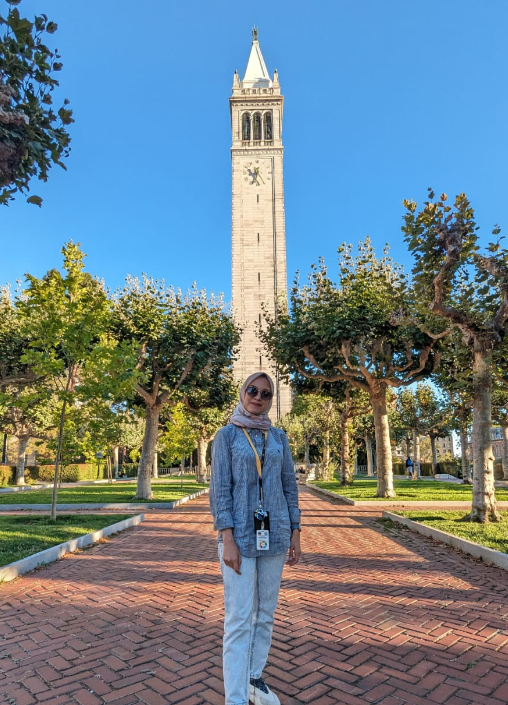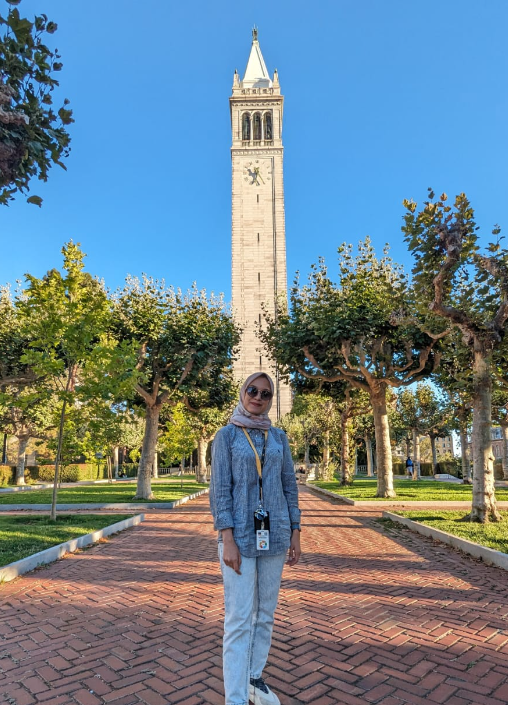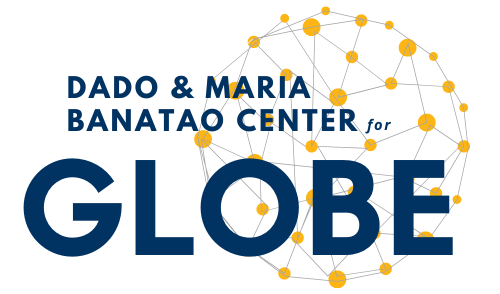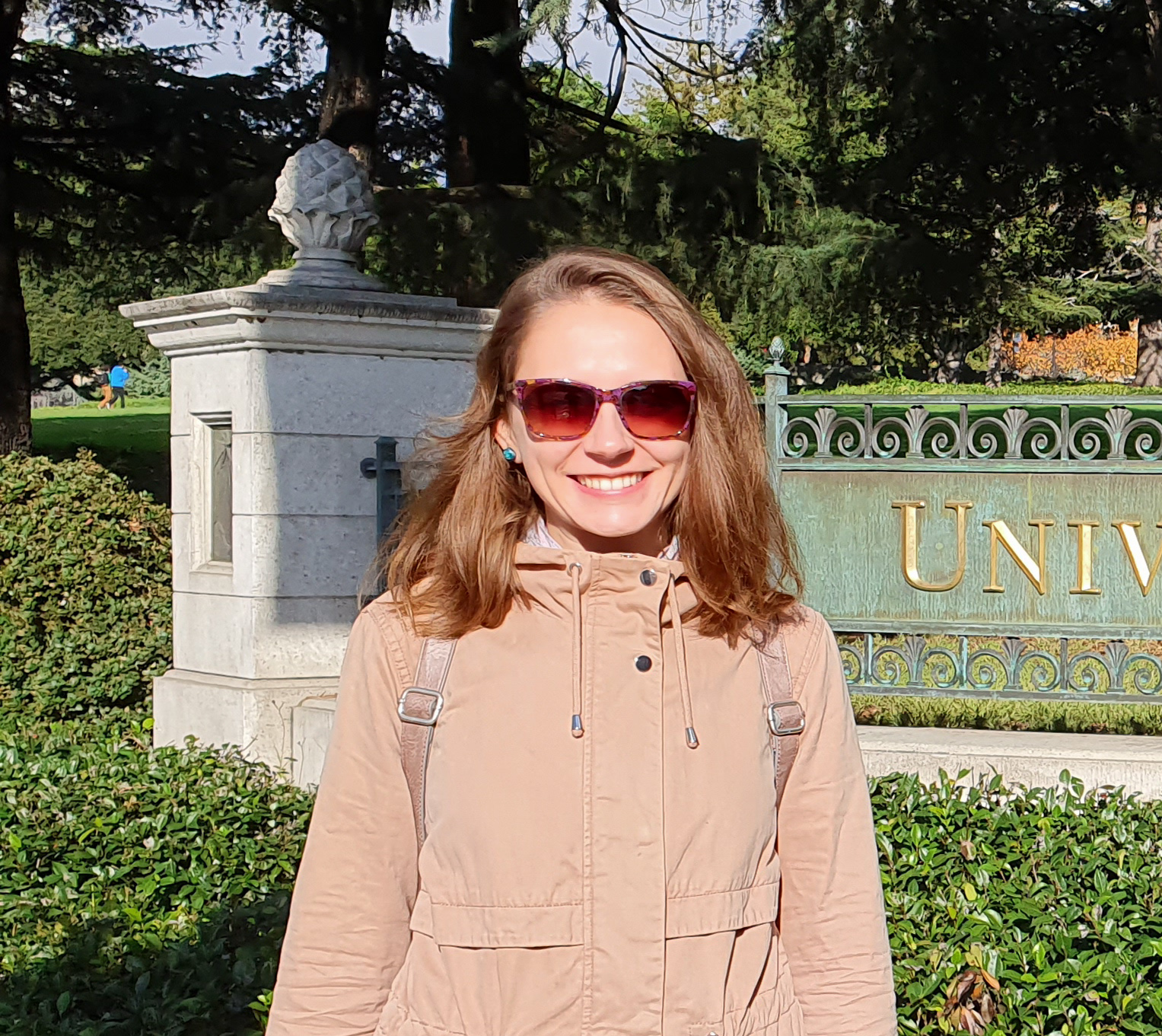Article was written by GLOBE Peer advisor Armina Mayya, who interviewed Nadhilah Reyseliani
Nadhilah Reyseliani is a Chemical Engineering faculty member at the Universitas Indonesia. She completed her undergraduate, Masters, and PhD degrees in Chemical Engineering at the Universitas Indonesia, where her research focused on energy systems electrification. Nadhilah came to Berkeley in September 2022 through the GLOBE Visiting Scholar program to complete the final year of her PhD on decarbonization in the Energy Resource Group, under Professor Dan Kammen. She now continues her research in Indonesia on extending electrification into the transportation sector. Her hobbies include cooking, traveling, and water sports. During her studies in Berkeley, she enjoyed going to the Berkeley Marina to kayak and travel to national parks, including the Grand Canyon and Zion National Park.

What made you decide to participate in the GLOBE visiting scholars program?
I came to UC Berkeley through the GLOBE program. In 2022, there was an offer to become a visiting scholar for a year at UC Berkeley for final-year PhD students whose topics are energy and bioengineering. Even though this offer is bridged by GLOBE, energy topics will be placed in the Energy Resource Group under the supervision of Prof. Daniel M Kammen. Before getting this offer, I had read and cited a lot of his papers in my dissertation. Plus, his experiences in government and various international organizations related to energy are very valuable, so this opportunity is certainly very interesting for me. It ended up meeting my expectations, that this
Visiting Scholar experience not only impacted the advancement of my research but also networking opportunities with universities, research institutions and other related stakeholders.
What was the focus of your PhD project?
My dissertation was about the energy transition for the Indonesia case study. Before I visited UC Berkeley, I had developed the Indonesia power sector model. With Prof. Dan, I extended my research, not only to analyze the power sector but also the electrification of the transportation sector to support energy system decarbonization.
How did coming to Berkeley enhance your PhD Experience?
Working with Prof. Dan enhanced my networking with the stakeholders [in the energy industry]. Dan knew people working in Indonesian study, [in both] the US government and in the Indonesian government. He introduced me to so many people from the academy, from the industry, and also from the government side.
How was your experience with research in UC Berkeley, and did you see any differences between the research environments at Berkeley and your home university?
I feel like there are so many differences between the way we run research at Berkeley and Indonesia. I can see the integration between the undergrad and grad students at Berkeley in the harmonization of their work. I also think that at Berkeley the professors facilitate the discussion between the undergrad and grad students. They have the undergrads and grads working together for their papers, under one team. I think it’s beneficial for a PhD student to have this support. The thing I like about Berkeley [is] between the students the discussion is very open. They pay attention to [the work you do] and give you insights, feedback, criticism, and comments.
.
What has been your career path from college graduation up to today? And why did you make those educational and/or career choices?
After undergrad, I did some research projects with my professor for 6 months and after that, I joined the fast-moving consumer goods industry for 2 years. During that time, I finally realized that my passion was conducting research, so I decided to resign and pursue a master’s degree and PhD. Then I got a scholarship for an integrated master’s and PhD program for a total of 5 years.
Did this experience help bridge the link between your hometown and Berkeley? If so, how?
Prof. Dan has a broad network in Indonesia. After COP 27, Indonesia is receiving $20 billion fund to support just transition, which this program one of which is led by the United States. I can say that my visit to Berkeley came at the right time when the world’s attention on the issue of decarbonization was focused on Indonesia and I was supported by Prof. Dan who has who has a familiar and good understanding of Indonesia decarbonization issue.
Can you describe your current job position?
Currently, I am a faculty member in Chemical Engineering at Universitas Indonesia and manage my lab, Sustainable Energy System and Policy Research Cluster. I am planning to continue my PhD research, and at present, I am mentoring two Master’s students from UC Berkeley alongside Prof. Dan, ensuring our research collaboration remains ongoing. These are my two first students from the Goldman School of Public Policy and from Development Engineering.
What would you say is your ultimate goal in research and your career?
I aspire to participate in Indonesia’s decarbonization strategy from an academic standpoint within the government. My goal is to emulate someone like Prof. Dan, who excels as a faculty member and professor while also actively engaging with government initiatives. My ultimate ambition is not only to conduct research but also to contribute significantly to Indonesia’s development.
What keeps you enthusiastic about your work?
What makes me very enthusiastic about my work is that there aren’t many people working on the power sector modelling for the Indonesian case study. There are a couple of models available for Indonesian case study, but rarely are they built by Indonesians directly. I am very eager to expand my knowledge, refine my models further, and engage in discussions with stakeholders from Indonesia and beyond. Throughout my PhD program, I collaborated on numerous projects with the government.
However, there are still many areas to explore. My visiting scholar
experience at Berkeley highlighted aspects that the US has already addressed but that I haven’t yet explored.
What has been one of the most challenging experiences in your academic journey so far? Do you have any advice on how to handle it?
During my PhD, I found it challenging to balance project work and research activities, a
common experience among many PhD students at Berkeley. Collaborating with stakeholders on projects related to my research added complexity, as I also had to prioritize publishing papers from my research. Juggling these responsibilities simultaneously was quite demanding.
Even now, I continue to face this challenge. Setting priorities is a must; you often have to choose between three options: maintaining a social life, having sufficient rest, and advancing your career. It’s necessary to select two of these to pursue actively. In my case, I prioritized my social life and career, which meant sacrificing some sleep. While not ideal, making such choices is often unavoidable.
Do you miss anything about being a PhD student?
What I miss about being a PhD student is the freedom to make mistakes. During that time, it was acceptable to encounter errors in research, provided that you learned from them and maintained honesty with your supervisor. I also miss attending classes and being part of my cohort.
What was the most valuable thing you learned as a visiting scholar in the College of Engineering at Berkeley that you would like to share with future visiting scholars?
What I’ve come to realize is that academia isn’t solely about conducting research and publishing papers; it extends beyond that. Building and expanding your network are crucial aspects. During my time in Berkeley, I had the opportunity to meet numerous individuals and establish connections with institutions like MIT and other US National labs. This networking eventually led me to join Lawrence Berkeley National Lab, where I completed a one-and-a-half-month internship focusing on Indonesian energy planning. Networking opens doors to diverse experiences and introduces you to a wide range of people and opportunities.
What advice would you give to current students concerning being a leader in not just the tech industry, but also in the classroom and in life?
I think wherever you are, industry or on campus, consistency is key. Without consistency in your work, sustaining a successful career becomes challenging. Being both consistent and passionate about your work is essential. While my PhD journey wasn’t flawless and there were moments of boredom, the key is to periodically reassess your initial goals. It’s important to reflect on whether you’re still working towards achieving those goals and to strategize effectively to stay focused on
your objectives.

Nadhilah Reyseliani
Chemical Engineering faculty member at the Universitas Indonesia. She completed her undergraduate, Masters, and PhD degrees in Chemical Engineering at the Universitas Indonesia, Nadhilah came to UC Berkeley as a GLOBE Visiting Scholar.
Article was written by GLOBE Peer advisor Armina Mayya, who interviewed Nadhilah Reyseliani.

